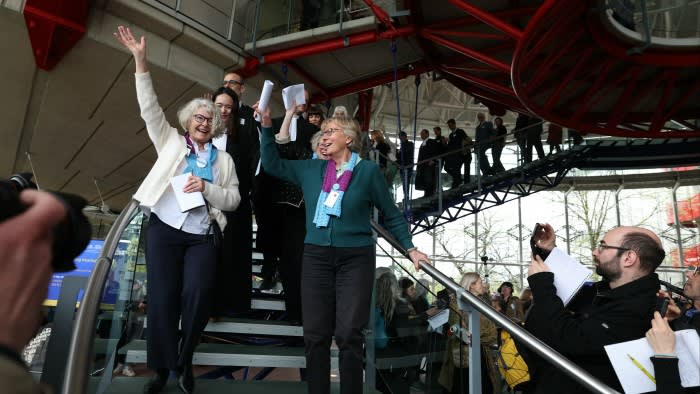Unlock the Editor’s Digest for free
Roula Khalaf, Editor of the FT, selects her favourite stories in this weekly newsletter.
When a group of Swiss women were vindicated in a legal claim that their government had failed to protect them from the impact of heatwaves, the move was hailed as a breakthrough for climate litigation.
Other litigants were watching on the sidelines, waiting to see what they could learn from the ruling by the European Court of Human Rights in April. Its decision in favour of the KlimaSeniorinnen — senior women for climate protection Switzerland — made it the first international court to give a ruling on the legal obligations of governments in fighting climate change, demanding fuller measures from the Swiss government.
The ruling found the government had “critical gaps” in its domestic regulations, including “a failure to quantify, through a carbon budget or otherwise, national greenhouse gas limitations”. But the ECHR declined to be “detailed or prescriptive” on what measures the Swiss government should take to comply with its obligations, instead calling for action “compatible with the conclusions and spirit of the court’s judgment”.
Although the Swiss parliament’s lower house voted to disregard the decision, the government has until October to come up with a plan for how it will implement the ruling. “The main thing in the KlimaSeniorinnen case is that Switzerland has to legislate,” argues Joana Setzer, research fellow at the Grantham Institute on Climate Change and the Environment, at the London School of Economics. “The court is not saying exactly what to do — it’s not saying how to brush your teeth, it’s just saying ‘brush your teeth’.”
For now, the exact consequences of the Swiss case remain to be seen, but it highlights how human rights law is being used to hold governments and companies to account for their impact on climate change. The 2,400-strong group of women, mostly in their seventies, had argued that the Swiss government had failed to protect them from “serious adverse effects of climate change on lives, health, wellbeing and quality of life” by not meeting targets to help tackle carbon emissions and warming.
“It’s the first time an international court has said that governments have a clear obligation to quantify a carbon budget,” says Louise Fournier, legal counsel at campaign group Greenpeace International, which supported the Swiss women.
Despite the ECHR’s general reluctance to take on so-called actio popularis claims — which are pursued in the public interest but without clear links to injured parties — the finding has created a precedent. It has also vindicated the group’s arguments that its legal right to demand action on climate change had been improperly denied under the court’s charter.
Adam Weiss, programme director at climate litigation group ClientEarth, which also backed the case, says the Swiss women were able to link individual impact to the broader cause: “They said, we’re not just any old people, we’re older people who belong to a group who are particularly vulnerable.”
Similar arguments about curbing fossil fuel use are now being applied by Greenpeace Norway. In 2021, it submitted a challenge at the ECHR to the Norwegian government’s decision to expand oil and gas drilling in Arctic waters. The campaign group argues that this would overshoot what it considers the country’s fair share of global carbon emissions.
Weiss expects to see human rights arguments being applied to more climate change and environmental litigation. Because many countries have human rights protection in their constitutions, judges are already familiar with how it works.
ClientEarth has pending cases in Belgium and Germany, for example, which assert a human right to breathe clean air as part of a right to a healthy environment. Like the Swiss case, the goal is to focus on individual litigants as part of a broader argument.
Fournier points to lessons from the KlimaSeniorinnen case that other litigants could draw on. First, there was a clear protagonist that pressed for, and eventually established, its legal standing to take action. It was the Swiss women who organised themselves through campaigning and through the lawsuit — deciding at every stage whether to appeal and what the next steps should be.
Second, detailed groundwork was done to establish a comprehensive range of evidence and arguments over what might constitute a country’s “fair share” of carbon use, based on its own historic contribution to global emissions and its ability to respond to climate change. In this case, Greenpeace International contacted other climate litigants across Europe to make sure everyone agreed with the arguments used to build its case, as the outcome could be beneficial for their cases too. “It was the KlimaSeniorinnen name on paper, but actually an effort by climate litigants around the world,” says Fournier.
Most of the climate litigation cases filed so far are against governments, but those against companies are receiving more attention.
Challenges made through courts or other regulatory bodies, such as advertising standards agencies, over alleged corporate “greenwashing”, have been the most successful, Setzer says. She cites the withdrawal of BP adverts in a campaign lauding the oil group’s low carbon credentials in 2020, after ClientEarth complained they misled.
While early greenwashing cases mostly targeted oil companies, she says there has been a shift towards targeting a wider range of companies that appear to be good but whose claims are misleading: “The fear of litigation is very powerful, especially corporate litigation.”
Yet claims against states and companies can take years to resolve, says Setzer. The Swiss case was first filed in 2016.
“I think we have to be creative about finding legal pathways that are faster,” says Weiss. “Maybe we should be targeting the courts where justice moves more quickly.”


